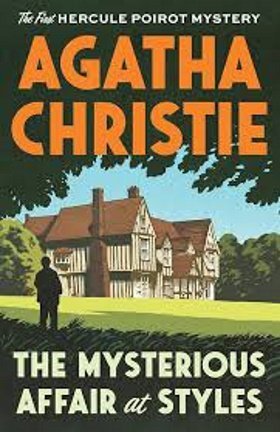“It might have been salt,” replied Poirot placidly.
I shrugged my shoulders. If he was going to take the matter that way, it was no good arguing with him. The idea crossed my mind, not for the first time, that poor old Poirot was growing old. Privately I thought it lucky that he had associated with him someone of a more receptive type of mind.
Poirot was surveying me with quietly twinkling eyes.
“You are not pleased with me, mon ami?”
“My dear Poirot,” I said coldly, “it is not for me to dictate to you. You have a right to your own opinion, just as I have to mine.”
“A most admirable sentiment,” remarked Poirot, rising briskly to his feet. “Now I have finished with this room. By the way, whose is the smaller desk in the corner?”
“Mr. Inglethorp’s.”
“Ah!” He tried the roll top tentatively. “Locked. But perhaps one of Mrs. Inglethorp’s keys would open it.” He tried several, twisting and turning them with a practiced hand, and finally uttering an ejaculation of satisfaction. “Voilà! It is not the key, but it will open it at a pinch.” He slid back the roll top, and ran a rapid eye over the neatly filed papers. To my surprise, he did not examine them, merely remarking approvingly as he relocked the desk: “Decidedly, he is a man of method, this Mr. Inglethorp!”
A “man of method” was, in Poirot’s estimation, the highest praise that could be bestowed on any individual.
I felt that my friend was not what he had been as he rambled on disconnectedly:
“There were no stamps in his desk, but there might have been, eh, mon ami? There might have been? Yes”—his eyes wandered round the room—“this boudoir has nothing more to tell us. It did not yield much. Only this.”
He pulled a crumpled envelope out of his pocket, and tossed it over to me. It was rather a curious document. A plain, dirty looking old envelope with a few words scrawled across it, apparently at random. The following is a facsimile of it.
04
CHAPTER V.
“IT ISN’T STRYCHNINE, IS IT?”
“Where did you find this?” I asked Poirot, in lively curiosity.
“In the waste-paper basket. You recognise the handwriting?”
“Yes, it is Mrs. Inglethorp’s. But what does it mean?”
Poirot shrugged his shoulders.
“I cannot say—but it is suggestive.”
A wild idea flashed across me. Was it possible that Mrs. Inglethorp’s mind was deranged? Had she some fantastic idea of demoniacal possession? And, if that were so, was it not also possible that she might have taken her own life?
I was about to expound these theories to Poirot, when his own words distracted me.
“Come,” he said, “now to examine the coffee-cups!”
“My dear Poirot! What on earth is the good of that, now that we know about the cocoa?”
“Oh, là là! That miserable cocoa!” cried Poirot flippantly.
He laughed with apparent enjoyment, raising his arms to heaven in mock despair, in what I could not but consider the worst possible taste.
“And, anyway,” I said, with increasing coldness, “as Mrs. Inglethorp took her coffee upstairs with her, I do not see what you expect to find, unless you consider it likely that we shall discover a packet of strychnine on the coffee tray!”
Poirot was sobered at once.
“Come, come, my friend,” he said, slipping his arms through mine. “Ne vous fâchez pas! Allow me to interest myself in my coffee-cups, and I will respect your cocoa. There! Is it a bargain?”
He was so quaintly humorous that I was forced to laugh; and we went together to the drawing-room, where the coffee-cups and tray remained undisturbed as we had left them.
Poirot made me recapitulate the scene of the night before, listening very carefully, and verifying the position of the various cups.
“So Mrs. Cavendish stood by the tray—and poured out. Yes. Then she came across to the window where you sat with Mademoiselle Cynthia. Yes. Here are the three cups. And the cup on the mantelpiece, half drunk, that would be Mr. Lawrence Cavendish’s. And the one on the tray?”
“John Cavendish’s. I saw him put it down there.”
“Good. One, two, three, four, five—but where, then, is the cup of Mr. Inglethorp?”
“He does not take coffee.”
“Then all are accounted for. One moment, my friend.”
With infinite care, he took a drop or two from the grounds in each cup, sealing them up in separate test tubes, tasting each in turn as he did so. His physiognomy underwent a curious change. An expression gathered there that I can only describe as half puzzled, and half relieved.
“Bien!” he said at last. “It is evident! I had an idea—but clearly I was mistaken. Yes, altogether I was mistaken. Yet it is strange. But no matter!”
And, with a characteristic shrug, he dismissed whatever it was that was worrying him from his mind. I could have told him from the beginning that this obsession of his over the coffee was bound to end in a blind alley, but I restrained my tongue. After all, though he was old, Poirot had been a great man in his day.
“Breakfast is ready,” said John Cavendish, coming in from the hall. “You will breakfast with us, Monsieur Poirot?”

























